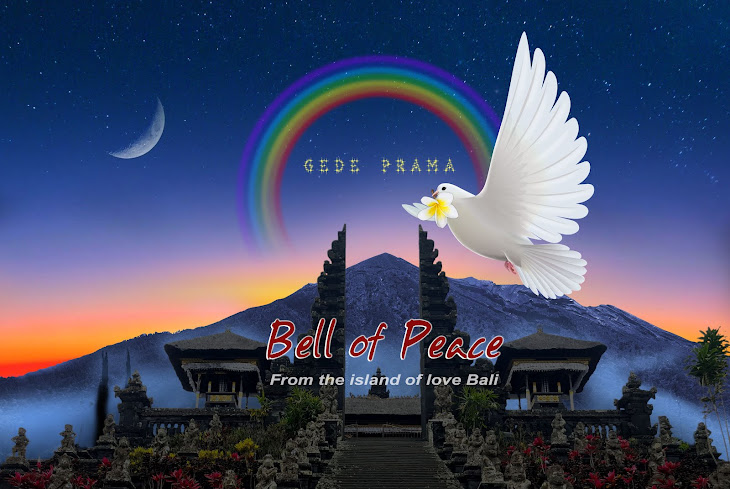The
account of the terrorist bombs is a story of sorrow. It is also the same with
the bombing in Bali. Hundreds of life were
devastated. Even though Australian citizens are the greatest number among
victims, but in the chill of death it is no longer relevant to talk about
nationality. It is more significant to discuss about the human's sufferings.
Everybody
wants to be happy, but some people daily life cause wounds and sufferings. The September 11 2001 attack on the World Trade
Center twin buildings was indeed a darkness. And it
tried to be solved by another darkness
by the United States and its
allies' invasion to Afghanistan
and Iraq.
So there went the second bombing in Bali, terrorist bomb in Turkey, suicide
bombing in Iraq, the kidnapping of Korean citizens in Afghanistan, the blasting
of an airport in London, in the year Of 2012 the city of Boston US again was
attacked by terrorist bomb.
Based
on this reflection, civilization is chasing around from one darkness of hatred to
other darkness of anger. In this case, Bali is
sharing the light of understanding. Maybe the opinion of some peace activists
is right, Bali
is the world's heritage of peacefulness.
The Light of Greatness
It
was in Bali that the hatred of terrorist bomb
(even though it happened two times) was not followed by more terrible malice.
Hatred, anger, and bitterness were responded by hands those were holding and
shaking each other. Hajj Bambang with his friends and Nyoman Bagiana Karang
with his associates in Kuta, Bali, were not
touched by the darkness of grudge, anger, and hatred. They walked radiantly
enlighten a lot of sufferings.
Years
after the tragedy, Hajj Bambang has received numerous national and
international awards. Nyoman Bagiana Karang has become a member of the
Indonesian parliament. Bali successively
acknowledged as the best island for tourist destination in the world from a
number of prestigious international medias. This is as if sharing lights of
understanding that, in a place where hatred is not confronted by hatred, anger
is not followed by anger, there hatred, anger, and grudge will be transformed
into greatness. Perhaps that is why the highest mountain in Bali
is the Agung (Great) mountain.
And
through this manner of responding, not only Bali
is painting the beauties of peacefulness, but also Islam through the exemplary
of Hajj Bambang and his friends. The heart-touching Islamic role-models were
not exist only in the Middle East, but in Bali
as well. Without asking about religion, Hajj Bambang and his friends forgot
about grudge, anger, hatred, and the fear of death in the grip of terror, to
walk hand in hand alleviated a lot of sufferings. With this drama, it is as if Bali intended to revive the beautiful expression of
Islam: rahmatan lil-alamin (be a blessing to the world).
Suffering is Purifying
As
have been told in many stories of humanity, sorrow is double-faced: devastating
and purifying. It is devastating when a person responds to bitterness and
irritation with even darker spirit. In this case, sorrow is similar to a
rolling ball of snow which is made bigger and bigger by the hays it rolled
upon.
Sorrow
purifies a being who has completely realized that there is guidance for life
within sufferings. Quoting the experience of the Sufis, since the message of
life exists even in the falling of a leave to the Earth, moreover in the
suffering that devastates hundreds of life. If we focus on the guidance in
every happening then suffering can guide us to the light. Let alone in the brightness,
the light also shines in the darkness. This light is also the one guided Kuta
in its time of sorrow.
In
Eastern wisdom, sorrow is a moment to pay back our debts to life, parents,
teachers, past time mistakes. Those who refuse fail to do the refund also
create new obligation. Whoever flows with the sorrow is compensating the debt
gratefully and then be free.
And
fortunate are those who are made holy by suffering. Mostly because the journey
passing myriad of sorrows grants them a boundless capacity to suffer. They are
as grand as the ocean, which does not get affected by anything thrown into it.
The greatness of life is unimaginable if death can be greeted in this manner.
Suffering is Connecting
Happiness
is indeed a charm. However, it does not teach anything. Suffering is full of
tears, yet there are so many humans made more perfect by suffering. Jalalludin
Rumi shines because the sorrow of losing both his teacher and his manuscripts.
Kahlil Gibran born and grew up in misery. Arjuna found enlightenment in deep
grief. Pema Chodron entered the gate of enlightenment after her haven of
loyalty toward her husband was trembled down by divorce.
Sorrow
often makes us sensitive and it also encourages us to join hands. Above all, it
forces us to profoundly realize that all beings are interconnected in this web
called life. Whatever done in this web (good-bad, holy-unholy, right-wrong)
will return to the doer.
Therefore,
it is not an exaggeration if we conclude that the sorrow of Bali
is ours as well. Does a rose not composed by
non flower elements (soil, water, sun light) as well? Does in the
terrorist cruelty not lie a mesh of millennial old hatred? Does Bali’s sorrow not reminding humanity that it is only by
love we can be happy? Apparently, suffering opens the window of love.
Only
a few seekers taking the journey into their own selves (through fasting,
meditation, dzikir, contemplation, yoga, etc.) wish to experience the taste of
sorrow. Yet sorrow still comes like a guest visiting a mansion of life. Sometimes
through disaster, death, misfortune, or failure. Nevertheless, whoever has been
illuminated by the understanding that suffering opens the window of love knows
that suffering is also a kind of light that guides the journey.


No comments:
Post a Comment